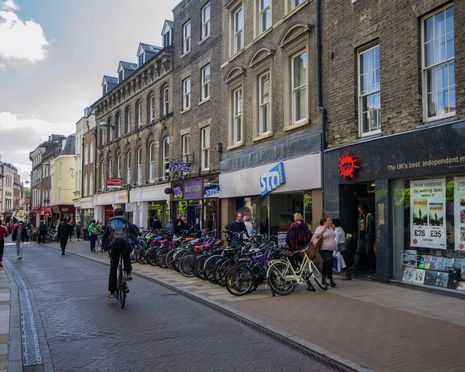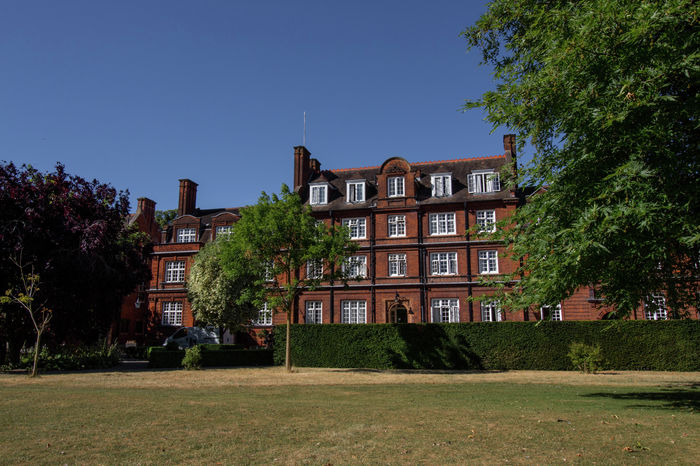There is no such thing as the ‘Cambridge Bubble’
Maya McFarlane argues that to conceive of Cambridge as a ‘bubble’ is rooted in privilege and wilfully ignores how forms of structural violence, such as racism, are perpetuated by the university.

There is a popular notion that Cambridge exists in a separate psychological plane, far removed from outside realities. With every sip of college port, and every use of strange jargon like ‘bop,’ ‘stash’ and ‘plodge,’ we fall further and further into another dimension. This phenomenon is often referred to as the ‘Cambridge bubble,’ legitimising and giving name to the detachment of Cambridge students from ‘real world’ issues. But, for us to face and work to dismantle systems of oppression, I argue that this bubble does not need to be ‘popped’ (a fairly benign and endearing metaphor often used) but disregarded as a conceptual apparatus. To believe that we exist in a bubble is a manifestation of privilege in its purest and most insidious form. Cambridge is not detached from wider society but a microcosm of it. It is a melting pot of the racist, heteronormative, classist, sexist and ableist structures upon which this country was built.
“To believe that you are detached from structures of oppression is to consciously ignore how you reproduce and benefit from them...”
The bubble metaphor implies that we are all equally immersed in the comfort of this nebulous disconnection. To be a person of colour, however, is to be inextricably connected to and aware of your oppression, no matter the institution you enter. Although some racist interactions we experience on a daily basis are classed as microaggressions, let me be clear: there is nothing ‘micro’ about the structural violence of this institution. Black students not only face a significant attainment gap, but are also forced to deal with the trauma of anti-blackness in solitude. The university’s reluctance to provide any meaningful tailored support leaves us drowning in different echoes of the same assertion: “you do not belong here.” The very fact that ‘BME’ communities are homogenised under this one label, functioning as a single alternative to the default category of ‘white,’ is testament to the limited theoretical space we are allowed to occupy in British society. It demonstrates the epistemic legacies of colonialism, establishing a world where whiteness is the norm. Cambridge is in no way removed from this world but, but actively perpetuates it.
At times, it feels as if you are an exhibit on display for your white peers to gawp at in awe. You become a spectacle of excellence and exceptionalism; a supposedly aspirational version of blackness which deserves to be praised and lauded. Beneath every comment about how hard you must have worked, and how difficult it must have been for you to get here, there is an implicit effort to detach you from ‘the other Black people’ who, by the logic of Great British meritocracy, simply did not work hard enough. As a social sciences student, it is often suggested that my degree may help me better theorise my oppression, giving me a leg up over those who simply do not understand the anthropology of their experiences! In a deep irony, considering its historic and contemporary role in theorising and perpetuating anti-blackness, Cambridge is cast as a sanctuary for Black students.
The notion of the Cambridge bubble is not the utopia you may think it is. To believe that you are detached from structures of oppression is to consciously ignore how you reproduce and benefit from them, thus allowing them to persist. We do not enter supervisions on an equal footing. While some have been instilled with enough private school confidence to ramble without fear of judgement, I am cautious of taking up too much of the conversation and constantly monitor my tone, for fear of being cast as the ‘angry Black woman.’ Unequivocally, a Cambridge degree does not make a marginalised person immune from all oppression. It is not a ‘get out of jail free’ card that I could show to a police officer if I were to be pulled over. Similarly to the criminal justice system, how could an educational institution like Cambridge protect me from racism if it is a primary breeding ground of it?
In the wake of the murder of George Floyd, a strong sentiment of shock arose amongst Cambridge circles. Your surprise and sudden outrage at something that we consistently live through is not endearing, it is an insult. Something should not come as a shock to you if you are surrounded by it every day. To feel detached from the wider world once you are within college walls is not inevitable. You are choosing to rid yourself of agency and choosing to believe that your political in-action is through no fault of your own. You blissfully lock your privilege away in a drawer, out of sight and out of mind, without stopping to question how exactly you came to possess the key; why Cambridge for you is such a fortified ‘bubble.’ Furthermore, not only is the metaphor essentialist and inaccurate, but extremely unproductive. Bubbles drift freely: there is no way to control their direction and any attempt to orienteer their course is futile. To view Cambridge in this way, as some impenetrable, fixed entity immune to change is to dangerously absolve ourselves of personal responsibility.
And so, when we return in October, you will have a choice. You could choose to actively critique the oppressive structures which continue to exist inside of Cambridge. Or, you could put on your gown and continue to shroud yourself in the warm illusion of otherworldliness.
 News / Cambridge and Manchester Universities meet for innovation partnership26 February 2026
News / Cambridge and Manchester Universities meet for innovation partnership26 February 2026 News / Private school teacher who lied about Cambridge degree barred from teaching27 February 2026
News / Private school teacher who lied about Cambridge degree barred from teaching27 February 2026 News / Cambridge academics sign open letter criticising research funding changes22 February 2026
News / Cambridge academics sign open letter criticising research funding changes22 February 2026 News / Judge Business School advisor resigns over Epstein and Andrew links18 February 2026
News / Judge Business School advisor resigns over Epstein and Andrew links18 February 2026 Theatre / The Memory of Water is dazzlingly well done27 February 2026
Theatre / The Memory of Water is dazzlingly well done27 February 2026









![How to Create an Attractive Freelancer Portfolio [5 Tips & Examples]](https://www.varsity.co.uk/images/dyn/ecms/320/180/2026/02/vitaly-gariev-ho2tNOWZYXM-unsplash-scaled.jpg)